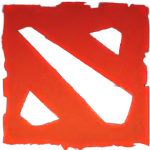Ever hate a game before even trying it, only to try it and then realize you may be in love with it? That is exactly where I am at with DOTA 2.
Since starting to get involved with League of Legends I have spent a lot of time learning about the history of DOTA and the MOBA genre. Defense of the Ancients, henceforth DOTA, was a mod to Warcraft III that featured teams of five players battling it out with NPCs and towers before destroying the opponents "Ancient". From those simple beginnings, DOTA grew to become massively popular. It's probably responsible for more Warcraft III sales (you need a copy to play the mod) than the actual RTS itself.
When I first started looking into DOTA there was a bit of misconception on my part (and most of the Internet apparently) about how popular it was. The numbers are highly disputed and even harder to nail down. Due to it being a mod, not officially supported by Blizzard (though they like to think it's their property), there is no press releases announcing its player numbers. However, through the playdota.com website, the DOTA lead developer Icefrog noted that approximately 7-10 million players have grabbed the game. And as that's not tracking China, there is speculation the real number is somewhere nearer 20 million. Originally I had come to the conclusion that there was about a million DOTA players worldwide.
So I suppose there is no time like now to admit I was wrong about DOTA's popularity considering I was invited to participate in the beta for Valve's DOTA 2. I may also need to retract my statements where I said DOTA 2 wouldn't be very popular. After playing the beta I'm absolutely floored at how smooth of an experience DOTA 2 is. It's one of the best beta tests I've ever participated in and there is so much more going on than just the game itself. The game is great, but the entire package it's wrapped in is what sells the title.
Before we get too far, let me back track. A lot of people assume my hate of DOTA 2 was coming from my long-standing support for League of Legends. I like League of Legends (LoL). LoL has taken the DOTA formula and made many improvements to it. LoL has done many, many things right and like DOTA2 it spent a lot of time on delivering the "complete package" rather than just the game play. LoL is a resounding success (to the tune of 30+ million accounts). LoL is also free 2 play, which makes it even more amazing as anyone can give it a try.
Now I could spend a lot of time detailing the differences between LoL and DOTA2, but I won't. The important thing to know is that LoL sought to create an update and refreshed version of DOTA while DOTA2 has only sought to recreate DOTA in a new graphics engine (Source) and tie it to a unified platform (Steam). When I had first heard this, I was very disappointed.
DOTA has many frustrating mechanics imposed on it due to the fact it was restricted by the Warcraft III engine. And as DOTA2 is a clone of DOTA being put into a new graphics engine, all of these mechanics were going to be copied over. As DOTA2 has progressed in development it has been very clear that DOTA and DOTA2 are aimed at being the same game. In fact, Valve hired on the lead DOTA developer, Icefrog.
To me that didn't make sense (and even now doesn't make much sense). Why free this game from the shackles of the WC3 engine only to keep the ball and chain? LoL was a smashing success because it dared to be different enough from DOTA while maintaining the classic game play everyone loved. Valve seems to have no interest in improving the experience of the DOTA game play. To them, why fix what isn't broke? While I'd argue that it may not be "technically" broke, some things are just kind of stupid from a design perspective.
But don't let me get off on tangents here. I was hating on DOTA2 because of Valve's seemingly unwillingness to improve on the DOTA experience which I had classified as the game itself. I was being ignorant to the fact that the game play of DOTA was only half the package. The exterior features were just as important and OH MY GOD did Valve hit a home run here.
The first time I logged into DOTA2 I was blown away at how slick the interface was. To my left showed me active users broken down by geographical area. A news feed scrolled the center. And most amazingly, live games that I could log into and spectate were on the right. A click later and I was watching a scrimmage match between some of the best known DOTA2 players in the world along with 200 watchers.
While there are live streams from top players for League of Legends and DOTA, there is nothing that compares to what Valve has put together. The spectator in DOTA 2 is actually in the game, clicking around, directing the camera, pulling up the scoreboard when they want to see it, and they are having a wonderful interactive experience. The difference is that of watching TV (streams) vs playing a video game (DOTA 2 observer mode). I've never enjoyed being a spectator of a video game until I spectated a match of DOTA2.
And in reality that is the point I'm trying to get at: DOTA 2 isn't a game, it's an interactive experience. It's true digital content for the digital consumer. League of Legends is to a degree the same, but it's not built-in (yet!) the way DOTA2 is. If and when LoL is able to build in some of the "digital consumer" features that DOTA2 features it will be equally as stunning (and IMHO LoL is an easier game to understand and spectate than the sometimes overly complex DOTA2).
DOTA 2 isn't perfect. It still has a long way to go to get all of the DOTA heroes added and kinks worked out (and by kinks I mean high skill level type stuff that 99% of the playerbase doesn't notice). The underlying tech is there and the game is solid as it is for the general populace. Yes, some annoying mechanics are going to exist in DOTA2 and that may or may not change with Valve at the helm (as I doubt 2 is going to diverge from the original anytime soon). The only real questions for DOTA2: when is it releasing and will it be free 2 play?
 Steam, as a platform, benefits from having as many users as possible. Every user is a potential game sale or series of sales. Valve, the developers of Steam, have come up with many, many ways to get users to buy into the platform. First, Steam is free to install. Second, they have great sales. And over the last year they have moved into the free 2 play realm bringing F2P MMOs to Steam and even releasing their own Team Fortress 2 as F2P. However, even with Team Fortress 2 being popular, I can't help but feel that Steam is missing a killer app that defines it. Steam needs a completely free app that will drive a massive rush of new blood to it's shores. The more I think about it, the more DOTA 2 is shaping up to be that killer app.
Steam, as a platform, benefits from having as many users as possible. Every user is a potential game sale or series of sales. Valve, the developers of Steam, have come up with many, many ways to get users to buy into the platform. First, Steam is free to install. Second, they have great sales. And over the last year they have moved into the free 2 play realm bringing F2P MMOs to Steam and even releasing their own Team Fortress 2 as F2P. However, even with Team Fortress 2 being popular, I can't help but feel that Steam is missing a killer app that defines it. Steam needs a completely free app that will drive a massive rush of new blood to it's shores. The more I think about it, the more DOTA 2 is shaping up to be that killer app.
